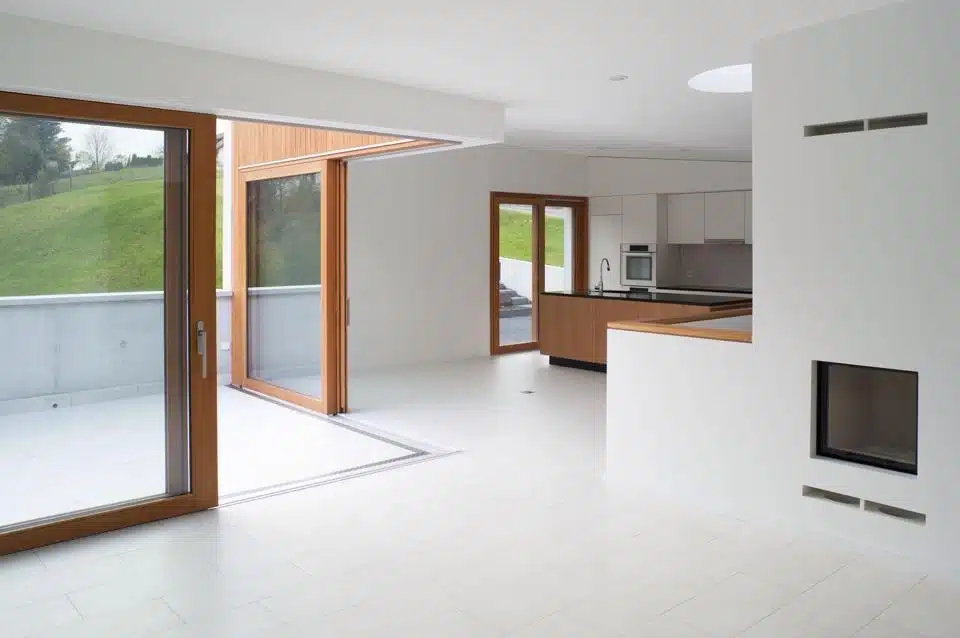
- Aesthetics and Design: Interior joinery, including elements such as doors, windows, mouldings and decorative details, plays a crucial role in the aesthetics and interior design of a building. During renovation, updating or customising these elements can transform the appearance of the space and adapt it to modern architectural styles.
- Functionality and ergonomics: Careful choice of doors and windows can improve the functionality and ergonomics of interior spaces. The installation of sliding doors, energy-efficient windows or customised solutions can optimise the use of space and improve occupant comfort.
- Energy Efficiency: The choice of appropriate materials and joinery techniques can contribute to the energy efficiency of the building. Well-sealed windows, well-insulated doors and other well-designed elements can help maintain a constant indoor temperature, reducing reliance on heating or cooling systems.
- Indoor Air Quality: Certain types of interior joinery, such as wood cladding, can have an impact on indoor air quality. Choosing materials that do not emit volatile organic compounds (VOCs) contributes to a healthier indoor environment.
- Adaptation to Standards: During renovation, interior joinery must comply with current standards and regulations in terms of safety, accessibility and fire resistance. Elements such as emergency exit doors must be installed in accordance with local regulations.
- Durability and Maintenance: Choosing durable, easy-to-maintain materials for interior joinery can reduce the need for frequent repairs and ensure a longer life for installed elements.
- Resale Value: Quality interior joinery can increase the overall value of the property. Potential buyers generally appreciate well-designed, good quality elements, which can influence the purchase decision and increase the resale value of the building.
- Personalisation of Space: Interior joinery allows the personalisation of space according to specific needs and preferences. Tailor-made solutions can be designed to make the most of the building’s distribution.
In short, interior joinery plays a crucial role in the renovation of buildings, influencing aesthetics, functionality, energy efficiency and the overall value of the property. Careful selection and design contribute to the creation of attractive, functional interior spaces that are adapted to contemporary needs.
PVC windows play a significative role in building renova8ons for a variety of reasons:
1. Energy efficiency: PVC windows offer excellent energy efficiency. Thanks to their thermal insulation properties, they help to maintain a constant indoor temperature, reducing dependence on heating or air-conditioning systems. This can translate into substantial savings on energy costs over time.
2.Acoustic insulation: In addition to their thermal efficiency, PVC windows also offer good acoustic insulation. They help to reduce the transmission of external noise inside the building, creating a quieter, more comfortable environment for occupants.
3. Durability and resistance: PVC is a durable, weather-resistant material. PVC windows are unaffected by corrosion and do not require frequent maintenance. Their durability contributes to the longevity of the building structure and minimises the need for constant repairs.
4. Low maintenance: PVC windows are renowned for their ease of maintenance. Unlike other materials, they do not require regular painting or special treatments. An occasional wash is all that’s needed to keep them looking and working as they should.
5. Variety of designs and styles: PVC windows are available in a wide variety of designs, styles and colours. This gives homeowners the flexibility to choose options that suit the architectural style of the building and their aesthetic preferences.
6. Environmentally friendly: PVC is a recyclable material, which means that at the end of its life it can be recycled to reduce its environmental impact. Opting for PVC windows can be part of a more sustainable and environmentally-friendly building strategy
7. Improved aesthetics: The installation of PVC windows can improve the overall aesthetics of a building. Their modern, sleek look can contribute to a more contemporary and attractive appearance.
8.Property value: The incorporation of energy-efficient and comfort-enhancing PVC windows can increase the value of a property. Potential buyers often see these features as beneficial and are prepared to pay more for a well-equipped building.
In short, PVC windows offer significant advantages in terms of energy efficiency, durability, low maintenance and aesthetic enhancement, making them an important choice in building renovation projects.


